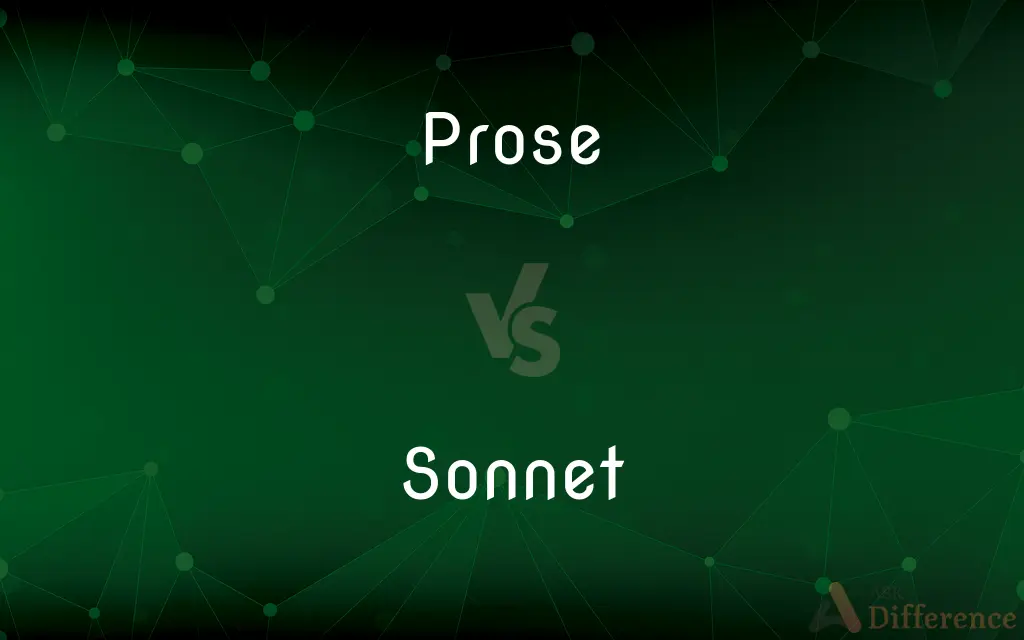Prose vs. Sonnet — What's the Difference?

Difference Between Prose and Sonnet
ADVERTISEMENT
Compare with Definitions
Prose
Prose is a form of written (or spoken) language that usually exhibits a natural flow of speech and grammatical structure—an exception is the narrative device stream of consciousness. The word "prose" first appears in English in the 14th century.
Sonnet
A sonnet is a poetic form which originated in the Italian poetry composed at the Court of the Holy Roman Emperor Frederick II in Palermo, Sicily. The 13th-century poet and notary Giacomo da Lentini is credited with the sonnet's invention for expressing courtly love.
Prose
Ordinary speech or writing, without metrical structure.
Sonnet
A 14-line verse form often in iambic pentameter, having one of several conventional rhyme schemes and usually featuring a shift in mood or tone after the eighth or twelfth line.
Prose
Commonplace expression or quality.
ADVERTISEMENT
Sonnet
A poem in this form.
Prose
Roman Catholic Church A hymn of irregular meter sung before the Gospel.
Sonnet
A fixed verse form of Italian origin consisting of fourteen lines that are typically five-foot iambics and rhyme according to one of a few prescribed schemes.
Prose
To write prose.
Sonnet
(intransitive) To compose sonnets.
Prose
To speak or write in a dull, tiresome style.
Sonnet
(transitive) To celebrate in sonnets; to write a sonnet about.
Prose
Language, particularly written language, not intended as poetry.
Though known mostly for her prose, she also produced a small body of excellent poems.
Sonnet
A short poem, - usually amatory.
He had a wonderful desire to chant a sonnet or hymn unto Apollo Pythius.
Prose
Language which evinces little imagination or animation; dull and commonplace discourse.
Sonnet
A poem of fourteen lines, - two stanzas, called the octave, being of four verses each, and two stanzas, called the sestet, of three verses each, the rhymes being adjusted by a particular rule.
Prose
(Roman Catholicism) A hymn with no regular meter, sometimes introduced into the Mass.
Sonnet
To compose sonnets.
Prose
To write or repeat in a dull, tedious, or prosy way.
Sonnet
A verse form consisting of 14 lines with a fixed rhyme scheme
Prose
The ordinary language of men in speaking or writing; language not cast in poetical measure or rhythm; - contradistinguished from verse, or metrical composition.
I speak in prose, and let him rymes make.
Things unattempted yet in prose or rhyme.
I wish our clever young poets would remember my homely definitions of prose and poetry, that is; prose - words in their best order; poetry - the best order.
Sonnet
Praise in a sonnet
Prose
Hence, language which evinces little imagination or animation; dull and commonplace discourse.
Sonnet
Compose a sonnet
Prose
A hymn with no regular meter, sometimes introduced into the Mass. See Sequence.
Prose
Pertaining to, or composed of, prose; not in verse; as, prose composition.
Prose
Possessing or exhibiting unpoetical characteristics; plain; dull; prosaic; as, the prose duties of life.
Prose
To write in prose.
Prose
To write or repeat in a dull, tedious, or prosy way.
Prose
To write prose.
Prosing or versing, but chiefly this latter.
Prose
Ordinary writing as distinguished from verse
Prose
Matter of fact, commonplace, or dull expression
Share Your Discovery

Previous Comparison
Aim vs. Idea
Next Comparison
Weldment vs. Weld













































